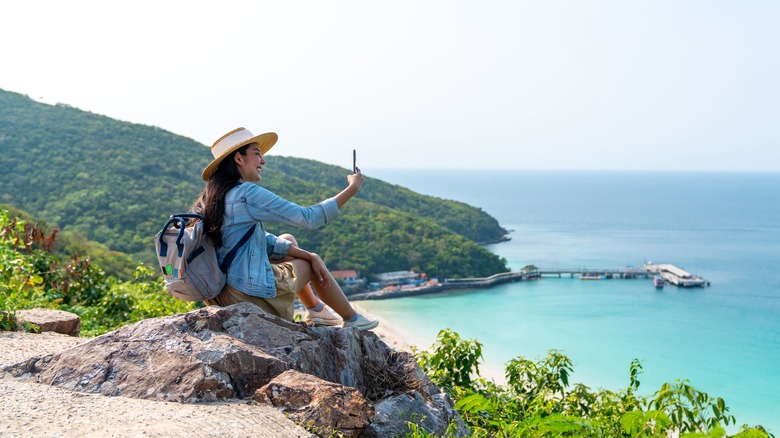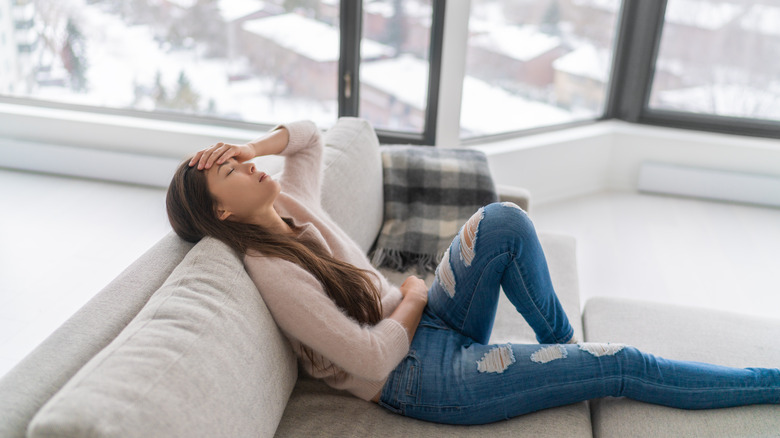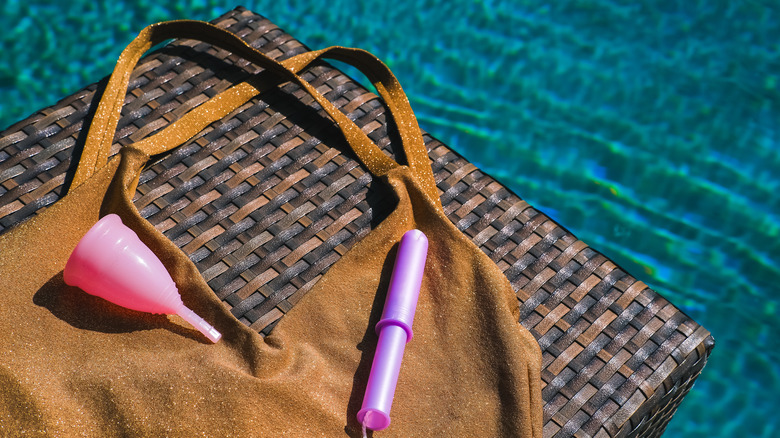Why Traveling May Disrupt Your Period
Traveling impacts your hormones, causing all sorts of changes that can affect your body as a whole. It's not uncommon to experience fatigue, tiredness, bloating, motion sickness, and other symptoms while on a plane, says the Cleveland Clinic. What's more, your stress levels can go through the roof and take a toll on your mood.
However, it's possible to encounter these issues even when traveling by car. Generally, switching time zones or changing your daily routine can impact your health and energy levels. For example, traveling to a different time zone may disrupt the circadian rhythm, leading to sleep problems, confusion, tiredness, and digestive discomfort, suggests a 2014 research paper published by Neuro Centrum. As the scientists note, these changes can interfere with the production of cortisol, melatonin, and other hormones.
Traveling can also alter the gut flora due to the changes your body goes through. Your diet, lifestyle, stress levels, and other factors all have an impact on gut microbes, explains a 2015 review presented in the journal Nutrients.
Perhaps not surprisingly, you may also notice changes in your period while on the road, but there are steps you can take to manage this aspect.
How does traveling affect your period?
Your period can tell a lot about your health, reflecting the changes your body goes through. For example, traveling can disrupt the body's internal clock, which may affect estrogen and progesterone levels. This chain of events can delay menstruation, according to the Hewitt Fertility Center. Stress, jet lag, and other factors that can affect your lifestyle during a trip may play a role, too.
"Any sort of stress, even 'good' stress like a vacation, can throw off your cycle," OB-GYN Carla Bossano told SELF. This lifestyle factor impacts the hypothalamus, altering the hormones that regulate menstruation. As a result, it can lead to delayed or missed periods. Travelers are also exposed to bacteria, viruses, and other microbes, which may increase their risk of getting sick. If that happens, they may experience changes in their menstrual cycle as well.
Sometimes, traveling can make a person's period lighter or heavier, according to clinical research published in Tropical Diseases, Travel Medicine, and Vaccines. In some cases, it may increase or shorten the duration of the menstrual flow. These issues are perfectly normal, and your period should get back on track once your trip is over.
However, you should see a doctor if you experience heavy bleeding for more than seven days and/or persistent pelvic pain during your periods. Also, it's not normal to feel extremely tired or have difficulty breathing when you're menstruating. Any of these symptoms should be evaluated by an OB-GYN.
How to manage your period when traveling
While it's possible to put your period on pause, that's not necessarily the best option. But if you decide to go this route, your doctor may prescribe birth control pills or norethindrone, a medication that can temporarily suppress ovulation. Another option is to take high doses of ibuprofen or naproxen, notes the Cleveland Clinic. However, these medications carry potential health risks ranging from kidney damage to peptic ulcers.
The best thing you can do is maintain your routine as much as possible. Even small changes, such as eating more carbs and starches than normal, can affect your period, explains the Hewitt Fertility Center. The same goes for your drinking habits, workout routine, sleep schedule, and other lifestyle factors. If you normally sleep seven to eight hours a night, try to do the same when traveling. This won't stop or delay your period, but it can help you cope better with stress.
Speaking of stress, try to relax and squeeze more "me" time into your schedule before going on a trip. If you start planning things out at the last minute, you might end up feeling overwhelmed. Last but not least, pack a menstrual cup, pads, or tampons, even if you're not expecting your period. These products take up little space and will come in handy if "Aunt Flo" arrives unexpectedly.


